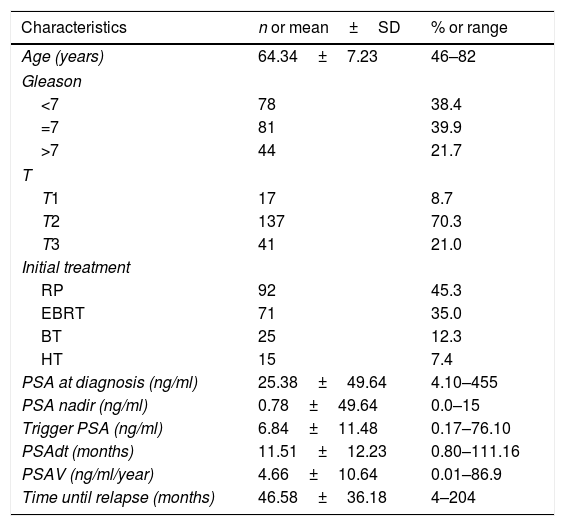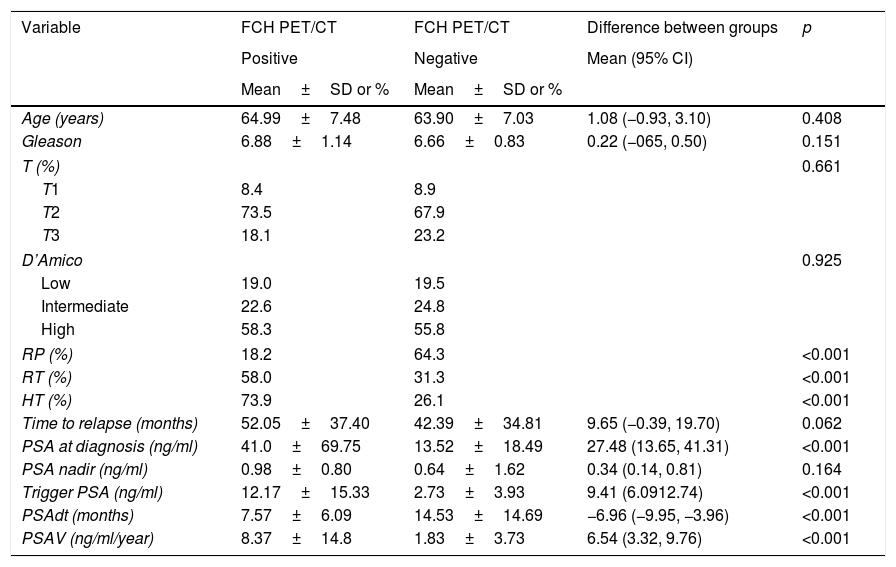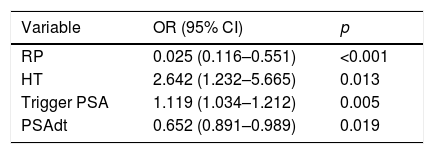To evaluate the capacity of 18F-fluorocholine positron emission tomography/computed tomography (FCH PET/CT) to detect biochemical recurrence of prostate cancer and to determine the correlation with PSA kinetics and influence of antiandrogen hormone therapy.
Patients and methodsObservational and retrospective study, which included patients with prostate cancer and criteria for biochemical recurrence and/or resistance to castration, according to the European Association of Urology. FCH PET/CT results were classified as positive or negative, using as gold standard the pathology report, findings of other imaging test, and/or clinical follow-up results. The correlation between FCH PET/CT and PSA kinetics (PSA at the time of exploration [PSA-trigger], doubling time [PSAdt] and velocity [PSAva]) was studied and the influence of hormone therapy was analysed.
ResultsThe study included 203 patients. The FCH PET/CT detection rate was 43.3%. The group of patients with FCH PET/CT positive showed more aggressive PSA kinetics (PSAdt: 7.5 months and PSAva 8.37±14.8ng/ml/year) than the FCH PET/CT negative group (PSAdt: 14.5±7.6 months and PSAva: 1.8±3.7ng/ml/year). The detection rate of FCH PET/CT in the subgroup with castration resistance was 89.1%, significantly higher than in the group with radical treatment at 29.9%, p<0.001.
ConclusionsFCH PET/CT is useful to detect biochemical recurrence of prostate cancer, especially in patients who receive hormone therapy or more aggressive PSA kinetics.
Evaluar la capacidad de la 18F-fluorometilcolina (FCH) tomografía por emisión de positrones/tomografía computarizada (PET/TC) en la detección de la enfermedad en la recidiva bioquímica del cáncer de próstata, su correlación con la cinética del antígeno prostático específico (PSA) y la influencia de la terapia hormonal antiandrogénica.
Pacientes y métodosEstudio observacional y retrospectivo, que incluyó a pacientes con cáncer de próstata y criterios de recidiva bioquímica y/o resistencia a la castración, según la Asociación Europea de Urología. Los resultados de la FCH PET/TC se categorizaron en dos grupos (positivo vs. negativo) utilizando como gold estándar la anatomía patológica, otras pruebas de imagen y/o seguimiento clínico. Se estudió la relación entre la FCH PET/TC y la cinética del PSA (PSA en el momento de la exploración [trigger-PSA], tiempo de duplicación [PSAdt] y velocidad de ascenso [PSAva]) y se analizó la influencia de la terapia hormonal.
ResultadosSe incluyeron 203 pacientes. La tasa de detección global de la FCH PET/TC fue del 43,3%. El grupo de pacientes con FCH PET/TC positiva mostró una cinética de PSA más agresiva (PSAdt: 7,5±7,5meses y PSAva 8,37±14,8ng/ml/a) que el grupo FCH PET/TC negativa (PSAdt: 14,5±7,6meses y PSAva: 1,8±3,7ng/ml/a). La tasa de detección de la FCH-PET/TC en el subgrupo con resistencia a la castración fue del 89,1%, significativamente mayor a la tasa del 29,9% del grupo con tratamiento curativo, p<0,001.
ConclusionesLa FCH PET/TC es útil en la detección de la enfermedad en la recidiva bioquímica del cáncer de próstata, especialmente en los pacientes con terapia hormonal o cinética del PSA más agresiva.











